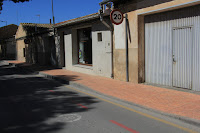Muak! Muak!

I'm not particularly good with people. I'm not particularly outgoing. I'm terrible at remembering faces (well whole bodies come to that) and I can forget names within a couple of sentences of being introduced. The opening phrases of a greeting are usually banal, sometimes surreal and occasionally bizarre. Greetings take me by surprise. It would probably be better if I stayed at home with a good book. The other day some people that I do recognise on the streets, members of a Spanish family, had one of the older members die. I didn't know what the form was so I didn't do anything. I wondered about going to the tanatorio, I wondered about the mass but a mix of embarrassment, fear of speaking Spanish and my general diffidence meant that I did nothing. As ill luck would have it I bumped into one of the family a few days later. She greeted me, we did the two cheeks kissing, I failed to understand what she'd said to me, I failed to pass on my condolences and as she wal...


















